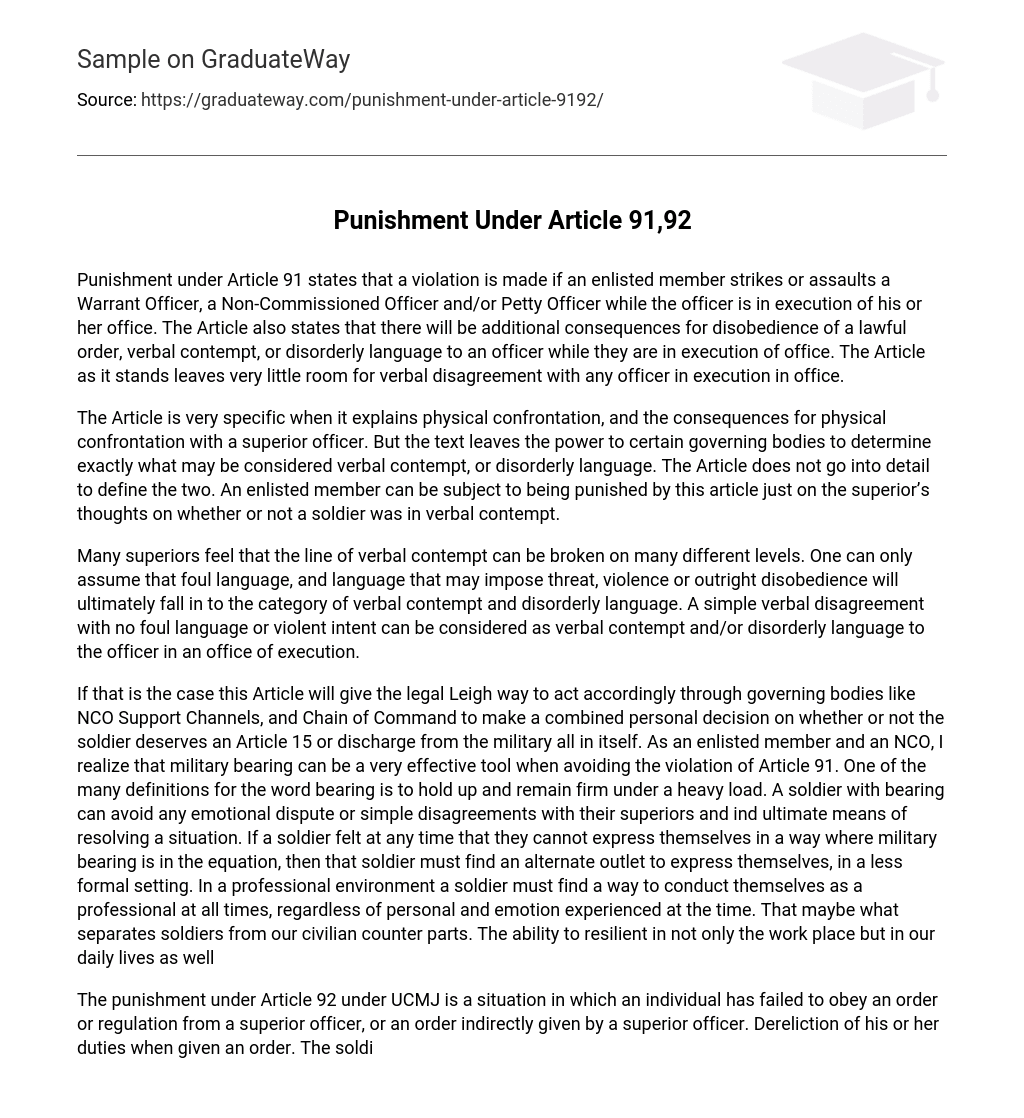According to Article 91, it is considered a violation if an enlisted member physically attacks or assaults a Warrant Officer, Non-Commissioned Officer, or Petty Officer while they are fulfilling their official duties. It also specifies that there will be further consequences for disobeying a lawful order, showing disrespect through words, or using disorderly language towards an officer while they are on duty. The current wording of the Article allows very limited opportunity for expressing verbal disagreement with any officer during their official tasks.
The Article provides a detailed explanation of the consequences for physical confrontation with a superior officer, while leaving the determination of verbal contempt and disorderly language to governing bodies. The Article does not offer specific definitions for these offenses. Consequently, an enlisted member may be punished under this Article based solely on the subjective judgment of a superior regarding whether the soldier displayed verbal contempt.
There are multiple levels at which superiors believe that the line of verbal contempt can be crossed. It can be assumed that any use of offensive language, as well as language that threatens, incites violence, or openly disobeys, will ultimately be classified as verbal contempt and disorderly language. Even a simple verbal disagreement without offensive language or violent intent can be seen as verbal contempt and/or disorderly language by an officer in a position of authority.
If this is the case, this article will provide the legal leeway to act accordingly through governing bodies like NCO Support Channels and Chain of Command, in order to make a combined personal decision on whether or not the soldier should receive an Article 15 or be discharged from the military. As both an enlisted member and an NCO, I understand the importance of military bearing when it comes to avoiding Article 91 violations. One definition of bearing is to hold up and remain firm under a heavy load. A soldier with bearing can avoid emotional disputes or disagreements with their superiors and find the best way to resolve a situation. If a soldier feels unable to express themselves while maintaining military bearing, they should seek an alternative outlet in a less formal setting. In a professional environment, a soldier must always conduct themselves as a professional, regardless of personal emotions. This may be what sets soldiers apart from civilians – their ability to remain resilient not only in the workplace but also in their daily lives.
The penalty for breaking Article 92 of the UCMJ is given to those who fail to follow orders or regulations from a superior officer, or neglect their duties after being told what they are. It is important for soldiers to know their assigned tasks, which can be proven with documents or spoken proof. When a soldier receives an instruction from someone in a higher rank, it becomes their responsibility to carry out that order, as long as it is considered fair and moral.
Military personnel must adhere to all general and direct orders, except those that are unlawful. It is mandatory for us to comply with every order unless it is not executed properly. Any order issued by a higher-ranking officer without the necessary authorization is deemed unauthorized. The responsibility of superior officers includes ensuring that soldiers are appropriately dressed, present at the correct location, and punctual. Consequently, superiors are forbidden from giving orders that would cause undue harm, encourage suicide, or involve hazing.
Enforced in the military are strict guidelines, like Article 92, which aim to reduce disobedience and uphold high standards. It is vital for service members to adhere to orders as it can have life or death implications. On the battlefield, following direct orders holds great significance as it safeguards not only a soldier’s life but also the lives of their unit.
Conversely, disregarding a particular direct order can have deadly consequences for both the soldier and others. The military has implemented Article 92 to maintain integrity throughout its various components. Despite the common belief that soldiers will unquestioningly obey every command due to their occupation, the authors of this article took a pragmatic approach. They recognized that soldiers may encounter situations where fear, emotions, impaired judgment, and personal factors could hinder their adherence to an order.
Because there are numerous controversial reasons why an order may be disregarded, the consequences may differ. The punishment may also vary depending on the specific order or the negative outcome resulting from disregarding the order. Article 92 is concise and direct, but our compassionate actions can occasionally lead us to defy a standard order. It is a natural emotion that can impact a soldier’s duty. Article 92 covers two types of dereliction: willful and negligent. Additionally, an orders violation charge may be imposed under article 92 for committing the same or similar conduct.
The consequences for willful and negligent disobedience can differ greatly. Willful disobedience is usually punished more severely compared to negligent disobedience. For instance, if a soldier deliberately disobeys an order, they should anticipate severe punishment. However, if a soldier fails to show up at a specified time or place due to uncontrollable circumstances like car problems or unforeseen traffic, this would be considered negligence. In such instances, the soldier could have avoided the situation by leaving earlier or ensuring their vehicle was well-maintained prior to departure.
Willful disobedience is when someone deliberately chooses not to work and instead uses their time for something else, ignoring a specific order. There are two distinct situations here. In one scenario, a soldier shows complete disrespect for the order and has no intention of following it during execution. However, in the other scenario, the soldier who committed the negligent act can still be cooperative, which allows for potential resolution in the future. Article 98 serves as an extra punitive measure within this context.





